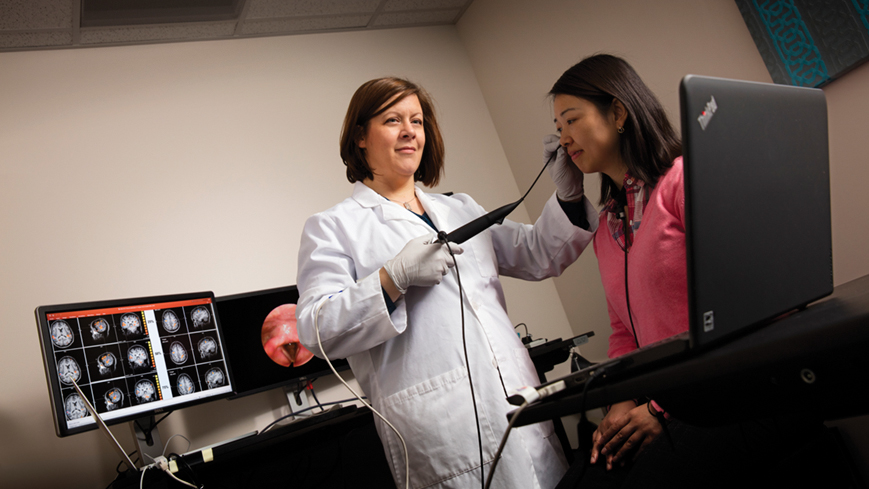
Angela Dietsch uses clinical experience to drive research on sensorimotor integration
23 Apr 2021 By Kelcey Buck
Angela Dietsch did not plan to be a speech-language pathologist. Her undergraduate training in communication disorders was meant to complement her pre-med studies on her way to becoming an otolaryngologist. Then she realized how much she enjoyed those communication disorders courses and her career path changed.
Dietsch, an assistant professor in Special Education and Communication Disorders, ended up graduating with a bachelor’s degree in communication disorders and a master’s degree in speech-language pathology, both from Saint Louis University. She then spent more than a decade working as a speech-language pathologist in medical settings before deciding to pursue her doctorate.
“The main motivators were intellectual curiosity and a general frustration with having to tell my clients and their families that there was so much we still don’t understand about how the brain and body work together for swallowing, speech, and other critical functions, much less how to facilitate recovery when injury or disease happen,” Dietsch said.
Since many of her clients during her time as a clinical speech-language pathologist had swallowing and/or voice disorders, Dietsch was familiar with the literature on those topics and had spent a lot of time thinking about what was known and unknown in those areas.
“I was particularly intrigued by the lack of information about how our sensory and motor systems work together to perform these important tasks – how can we measure anything about swallowing without considering what is being swallowed, or examine voice without considering how we adjust our output based on what we hear? Is it possible to manipulate the sensory information in ways that can help rehabilitate problems with speech, voice, and swallowing?”
After completing her Ph.D. in speech-language pathology at the University of Kansas, and post-doctoral training at Walter Reed National Military Medical Center, Dietsch knew the University of Nebraska-Lincoln would be a good fit as she pursued her research career. She saw key assets that would help her be successful, including strong mentors in the Department of Special Education and Communication Disorders, neuroimaging resources at the Center for Brain, Biology and Behavior (CB3), and clinical contacts at the Barkley Speech Language and Hearing Clinic.
“UNL has provided many opportunities and challenges that have pushed me to expand my work in new directions,” Dietsch said. “I have had a few exceptional supporters who really believe in my ideas and understand that such unique and focused research requires one to build their own foundation.”
Through her Sensorimotor Integration for Swallowing and Communication (SISC) Lab, Dietsch has not only advanced her own research career, but also mentored more than two dozen students in conducting research as well.
“I am extremely proud that I have been able to support so many student researchers, from undergraduates to doctoral students, in pursuing their own research goals through work in my lab,” Dietsch said. “It’s a unique responsibility and one that is so important to the future of our field.”
Dietsch was recently promoted to associate professor and granted tenure, effective in August 2021. She sees those milestones as both recognition for the hard work she has done the past six years at Nebraska and a reminder to continue to grow.
“It is an honor to have such an affirmation that I’m doing quality work with perceived value to my professional community,” Dietsch said. “I also see it as a challenge – or at least an invitation – to keep pushing ahead with high expectations for myself, my students, and the university as we take on the many challenges that lie ahead.”
Special Education and Communication Disorders
College of Education and Human Sciences